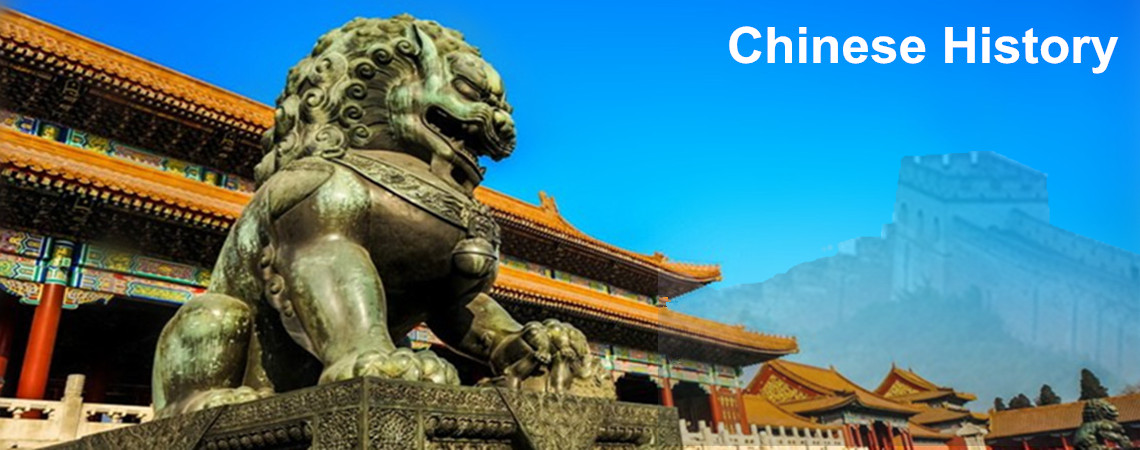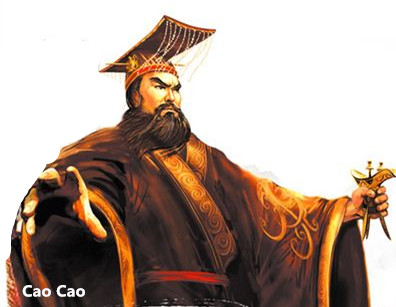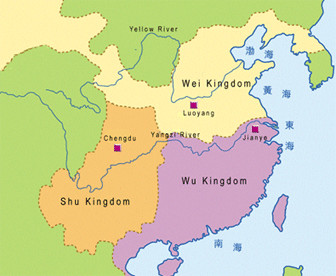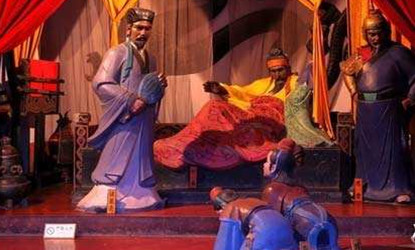
Three-Kingdom(220-280)
Facts of the Tree-Kingdom Period
Time: 220A.D.-280A.D.
Emperors: Cao Pi (Wei), Liu Bei ( Shu) , Sun Quan ( Wu)
Replaced by: Jin Dynasty
Introduction of the Three Kingdoms
Civil war during the Late Period of the Eastern Han
In 189, after Emperor Ling of the Eastern Han dynasty died, a young emperor - Emperor Shao was put on the throne. Resenting the manipulation of eunuchs, two generals Yuan Shao and He Jin plotted to murder them. During the chaos caused by the fighting between the eunuchs and generals, Dong Zhuo, a treacherous court official of the Eastern Han drove his army into Luoyang. With full political power in his hand, Dong Zhuo dethroned Emperor Shao and put Emperor Xian on the throne. All Dong's deeds aroused strong protest from the courtiers and many local officials. As the political situation became acute, a large-scale civil war finally broke out.
 After Dong Zhuo invaded Luoyang, Cao Cao fled to Chenliu (currently southeast of Kaifeng in Henan Province) and began to assemble military forces to revolt. In 193, Dong was killed in a mutiny but the melee remained. This period of unrest continued until 196, Balkanized areas were formed among which the most two powerful ones were those of Yuan Shao and Cao Cao.
After Dong Zhuo invaded Luoyang, Cao Cao fled to Chenliu (currently southeast of Kaifeng in Henan Province) and began to assemble military forces to revolt. In 193, Dong was killed in a mutiny but the melee remained. This period of unrest continued until 196, Balkanized areas were formed among which the most two powerful ones were those of Yuan Shao and Cao Cao.
In 196, Cao Cao held Emperor Xian under duress and took this advantage to strengthen his military power. In 201, with comparatively weaker strength, Cao Cao defeated Yuan Shao in the Battle of Guandu after which he gradually unified the northern area of China. In 209, Cao Cao drove his troops to the southern area and captured Jingzhou. But when he wanted to expand his power further to the south, he was defeated by the allied forces of Liu Bei and Sun Quan in the Battle of Red Cliff and thus he withdrew his army back to the central plains of China.
 ►In 220, after Cao Cao died, his son of Cao Pi proclaimed himself emperor, with Wei as his National Title and Luoyang as his capital city.
►In 220, after Cao Cao died, his son of Cao Pi proclaimed himself emperor, with Wei as his National Title and Luoyang as his capital city. ►In 221, Liu Bei proclaimed himself emperor, with Shu his national title and Chengdu the capital city.
►In 229, Sun Quan proclaimed himself emperor in Wuchang (currently Wuhan), and later moved the capital to Jiankang (currently Nanjing), with the national title Wu.
Since then, the so-called Three Kingdoms' Tripartite Confrontation was formed. On the whole, Wei occupied the north, Shu occupied the southwest and Wu occupied the southeast.
Throughout the Three Kingdoms Period, battles between the three countries were countless. Among those, battles between Shu and Wu fighting for Jingzhou, Shu and Wei fighting for Hanzhong as well as Wei defeating Shu were all illustrious ones in Chinese history.
In 222 the Shu troops declared war on Wu, both Armies met in full force at the battle of Yiling. Liu Bei was defeated by Sun Quan's General Lu Xun, and was forced to retreat back into Shu territory, where he soon died.
 In 223, Liu Bei's son, Liu Shan, rose to the throne of Shu, and formed an Alliance with the powerful state of Wu. The Alliance was strong, and led by the Brilliant military Strategist, Zhuge Liang. He led many attacks on indiginous Tribes to the south of the Shu Province. After the defeat of the Nanman tribe, Zhuge focused north on Wei. He attempted 5 conguests on the northern State of Wei, but failed with his death in 234 AD.
In 223, Liu Bei's son, Liu Shan, rose to the throne of Shu, and formed an Alliance with the powerful state of Wu. The Alliance was strong, and led by the Brilliant military Strategist, Zhuge Liang. He led many attacks on indiginous Tribes to the south of the Shu Province. After the defeat of the Nanman tribe, Zhuge focused north on Wei. He attempted 5 conguests on the northern State of Wei, but failed with his death in 234 AD.
Wei began to experience some turmoil between two of the biggest Clans in Wei, the Cao Clan and the Sima Clan. Cao Huan succeded Cao Mao after his death in 264 AD. eventually, Cao Huan claimed Wei a Dynasty. But opposition from the Sima Clan grew and in 264 Sima Yan siezed the throne and forced Cao Huan to Abdicate his Kingship over to Sima Yan, who then Founded the Jin dynasty.
The Fall of Shu began to take place in the late 230s. The decline of the Cao clan mirrored that of the kingdom of Shu. Zhuge Liang had captured much of Wei's land in his conquests of the north and gained the title of Lieutenant Chancellor. After his death, that title went to Jiang Wei, Fei Yi, and Dong Yun in that order. The Politics in the Shu Kingdom began to be run by the eunuch faction, and then Corruption rose into politics. Even with the efforts of Jiang Wei trying to capture more Wei land, the Shu forces were never able to make a decisive victory against Wei. After the capital city of Shu, Chengdu, was surrounded Liu Chan surrendered to the wei forces, ending 43 years of Shu.
The fall of Wu began with the death of Sun Quan if 252AD. Wu began to go into a period of Steady decline. Successful Wei oppression of Rebellions in the huainan Region reduced any chance of influence for the Wu. after the death of Wu Emporeor Sun Xiu, the throne went to Sun Hao. Sun Hao was a promising young man and revered by many. But eventually, he became a tyrant. Eventually, the Jin dynasty prepared and initiated an attack upon the Wu Dynasty. In 273 AD, Lu Kang, the last General of Wu died, leaving no competent sucessor to the kingdom of Wu, thus causing them to surrender to the Jin Dynasty ending the Three Kingdoms Era.
Finally, the end of the Three Kingdoms Period started from the Sima Yan (son of Sima Yi and chancellor of Wei)'s usurpation of Wei and the establishment of the Jin Dynasty (265 - 420). In 282 when the Jin army conquered the last kingdom - Wu's capital, the Three Kingdoms Period was ended.Economy during the Three-Kingdom Period
Upon the founding of the three kingdoms, rulers of each kingdom all committed to improve the way of ruling and develop their national economy.
In the Kingdom of Wei, Cao Cao made many reforms to discard old policies inform previous dynasties.
The Tun Tian (farming done by soldiers) System was also carried out, which greatly promoted the national productivity. In the Kingdom of Shu, Zhuge Liang set up strict social order and tried to govern the kingdom by law. With his assistance, Shu's agriculture and handicraft industry developed rapidly. Additionally, Shu formed a friendly relationship with ethnic minorities in southwestern areas.
n the Kingdom of Wu, the shipbuilding industry was much more prosperous. As for the national strength, Wei ranked first, Wu second and Shu third.






 Ask Questions ?
Ask Questions ?